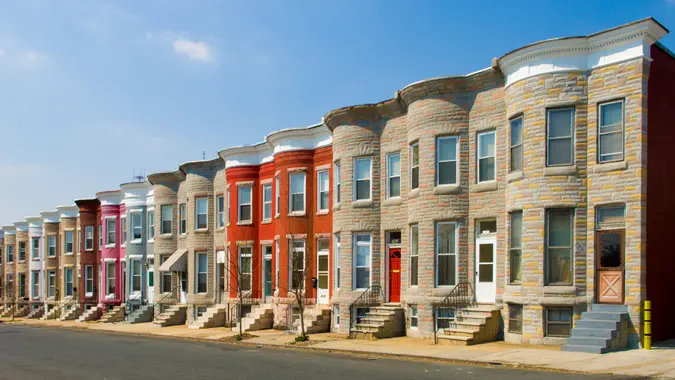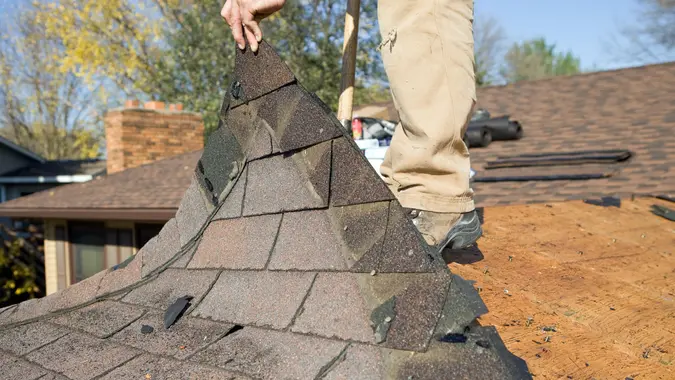Nearly 40% of Americans Believe Mortgage Rates Will Rise in 2024: Here’s What Experts Say

Commitment to Our Readers
GOBankingRates' editorial team is committed to bringing you unbiased reviews and information. We use data-driven methodologies to evaluate financial products and services - our reviews and ratings are not influenced by advertisers. You can read more about our editorial guidelines and our products and services review methodology.

20 Years
Helping You Live Richer

Reviewed
by Experts

Trusted by
Millions of Readers
GOBankingRates surveyed 1,039 Americans aged 18 and older from across the country between November 9 and November 13, 2023, asking how much they think mortgage rates will fall over the next year.
Unsurprisingly, given the economic rollercoaster we’ve all been riding over the last few years, 38.88% of respondents are prepared for mortgage rates to rise even further. Even among those who foresee a decline in mortgage rates, the majority remain cautiously optimistic and think rates won’t lower more than 2%
So, what’s the verdict? Will 2024 be a better year for prospective homebuyers eyeing the real estate market?
Will Mortgage Rates Rise in 2024? Here’s What Experts Think
No one has a crystal ball to predict the future, so it’s difficult to predict with 100% certainty where mortgage rates will be in the upcoming year. However, Jacob Channel, senior economist for LendingTree, sees 2024 as having a greater probability of interest rate cuts than not.
“Going into the next year, the economy should remain resilient while problems such as relatively high inflation continue to get better. If this happens, bond markets become less erratic, and the Fed starts cutting rates sometime in the second half of next year — which they currently appear poised to do — then mortgage rates should fall in 2024.”
Overall, Channel believes the economy is headed in the right direction. While there are certainly still causes for concern — for example, inflation has yet to return to the Fed’s ideal levels, and American households are currently sitting on a total of $17.29 trillion worth of debt — unemployment is lowering, and people aren’t defaulting on their loans in particularly large numbers.
So, despite the economy still facing numerous headwinds, Channel predicts that the average rate for a 30-year, fixed mortgage this time next year could very well be closer to 6% than 7%.
However, while Channel is optimistic about 2024, he emphasizes that even if interest rates fall, they likely won’t plummet dramatically.
“Remember that mortgage rates are often volatile on a week-to-week basis,” he cautioned. “This means even if they do lower next year, they probably won’t fall uniformly. On the contrary, there likely will be some weeks where rates rise, even if the longer-term trend points to them declining.”
Is 2024 a Good Time To Become a Homeowner?
“With so much geopolitical unrest, a looming election year and economic uncertainty, you should wait to see what the market looks like in Q1 of 2024 before considering a purchase,” advised Christopher M. Naghibi, executive vice president and Chief Operating Officer (COO) of First Foundation Bank.
However, if you can afford a home that’ll fit your needs in the 2024 housing market, Naghibi believes you shouldn’t worry too much about whether you might get a better deal by waiting.
“Homeowners should buy based on their needs and the utility of the home. So, it is never truly a ‘bad’ time to buy. It just comes down to how long you’re willing to hold the property, as good and bad economies are cyclical,” Naghibi said.
Channel agrees. “I wish I could be more specific about whether or not people should buy in 2024, but I can’t. Homebuying is a personal decision, and whether or not it’s a good idea depends heavily on your budget and circumstances,” he emphasized.
So, while being mindful of the geopolitical and economic landscape is important, the decision to buy a home ultimately hinges on your individual needs.
What To Know Before Purchasing A House in 2024
If you’re set on purchasing a property regardless of what the housing market looks like in 2024, make sure you know what to expect. Here’s what you need to know before taking out a home loan:
Your Financial Health and Credit Score Matter
Mortgage Lenders take into consideration financial factors like your credit score and payment history to determine your creditworthiness as a borrower. The stronger your financial profile, the higher your chances of securing a mortgage with better terms.
If you don’t know where you stand in terms of your credit health, request a free copy of your credit report from the three major credit bureaus at AnnualCreditReport.com.
Research Loan Options and Mortgage Terms
Before applying for a mortgage, familiarize yourself with the various types of mortgage loans and their terms. Different loans come with different interest rates, down payment requirements, eligibility criteria and repayment structures.
For example, government-backed loans like FHA loans typically allow borrowers to put as little as 3.5% down, whereas conventional loans may require a 20% downpayment to avoid private mortgage insurance. Try qualifying for a loan that aligns with your needs and financial circumstances.
Get Pre-Approved Before House-Hunting
A pre-approval is an offer from a lender indicating the type and amount of mortgage you could qualify for based on your credit score and other financial factors.
Getting pre-approved not only gives you a better idea of what houses you can afford but also strengthens your position when making offers — as it shows sellers that you’re a serious and qualified buyer.
Don’t Forget Closing Costs and Fees
Closing costs are fees for services like appraisals, inspections and legal processes you pay upon closing. Average closing costs typically run between 3% and 5% of the home purchase price.
So, if the property is $300,000, prepare to shell out anywhere from $9,000 to $15,000 to cover these expenses.
 Written by
Written by  Edited by
Edited by 

























